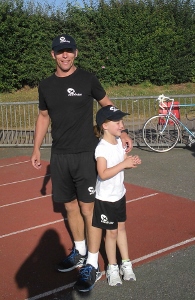Main Menu
Latest Blog Entry
User login
Beware of the Mom Taper
“Jodie can’t make training tonight because she is exhausted and worried about her homework deadlines”
 A phone call, text or email late in the day from the Mum, and your plans for the night’s training session are scuppered. This is extremely frustrating as a coach. It happened to me 3 times last week alone.
A phone call, text or email late in the day from the Mum, and your plans for the night’s training session are scuppered. This is extremely frustrating as a coach. It happened to me 3 times last week alone.
In all the talk about periodisation, planning and competition preparation, the likes of Tudor Bompa and Vladimir Issurin have neglected to include the impact of the “Mom Taper”.
I have scoured the research and documents surrounding the Long Term Athlete Development (LTAD) Model by Balyi, Cote et al and I have yet to find the “Mom Taper” mentioned.
For all the theory in the world, I am interested in what is happening on the ground. As a coach who has worked with teenage athletes and their parents for over 10 years, I have tried and failed to implement long term plans. But why does the Mom Taper trump my plans?
Put yourself in Mum’s shoes.
 First off, it is important to remember that the young athlete is the Mum’s son or daughter. They will always be their child. We as coaches are temporary influences (hopefully positive) in their lives. The longest I have coached any single athlete is 7 years.
First off, it is important to remember that the young athlete is the Mum’s son or daughter. They will always be their child. We as coaches are temporary influences (hopefully positive) in their lives. The longest I have coached any single athlete is 7 years.
I repeat, the young athlete is the Mum’s child first and foremost.
Most Mum’s I know want the best for their child. They are busy trying to juggle work, managing the home and being the taxi driver for 2 or 3 children going to multiple venues on different nights.
They are under pressure to attend every single training session, drive to the competitions, help with homework and somehow pay for all the kit, fees and fuel. They are surviving week to week, and have little time to sit down and think ahead.
(I have to switch my phone off on Sundays, because I get a flurry of texts from about 8pm to 10pm as the Mums finally get a chance to sit down and look at the week ahead!)
This results in;
- fixture overload
- training conflicts
- falling behind on homework assignments
- poor eating habits
- lack of rest.
This then leads to a short time crisis of homework panic or illness.
Is it any wonder the Mum cancels training?
(This is different from the “I don’t want Jodie getting sweaty doing exercise” version of the Mom taper:it’s impossible to taper off a taper. I have little tolerance for that!)
4 ways coaches can help prevent this problem
 Realise that the world is bigger than our sport and our sessions. Ask the Mum and the athlete what else is happening in their lives.
Realise that the world is bigger than our sport and our sessions. Ask the Mum and the athlete what else is happening in their lives.- Sit down and plan 4 weeks at a time with the Mum and athlete. This is essential and is the Number 1 reason why the athletes I work with predominantly avoid injury. This is an eye opener for coach. parent and athlete alike. (Use these free 4 weekly planners)
- Be adaptable: know your athletes and adjust the sessions according to how they look and feel. They may need 10 minutes of play time and “mucking about” to get rid of the calculus residing in their brain from an exam that afternoon.
- Perhaps most importantly, and hard to do, have a real honesty check about the necessity of the sessions. Do our cricketers need winter nets? Is that athlete centred, or is it cricket coach’s income stream centred? Do we have to have 6 hours of selection games on a Sunday in the rain, let alone 4 Sundays in a row. How much value is being added here?
Summary
It is easy to criticise Mums about last minute cancellations, but we as coaches need to recognise the landscape we live in (Living and coaching in Devon, I understand the amount of driving that is required too). I find that advance communication helps all parties.
Further reading:
- Training the young athlete
- Is my child overtraining?
- Planning your training: block periodisation for young athletes.
Hat tip to Chris Webb for the term “Mom Taper”.
Client Testimonials
 Blundells School
Blundells School
James has a huge breath and depth of knowledge on fitness issues. He is able to implement this knowledge into a practical course both making the task of fitness and conditioning both different and interesting from other fitness training that most are familiar with. He understands the safety issues when dealing with young adults strength and conditioning programmes. Programmes he sets are tailored to the individual needs of the group. There was a huge amount of progress made with some of these individuals in terms of their understanding of fitness and their own fitness levels.
More

